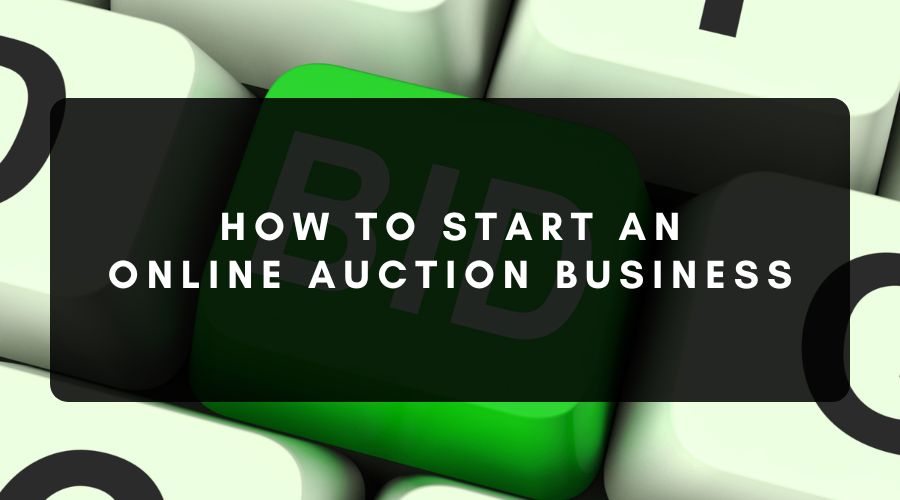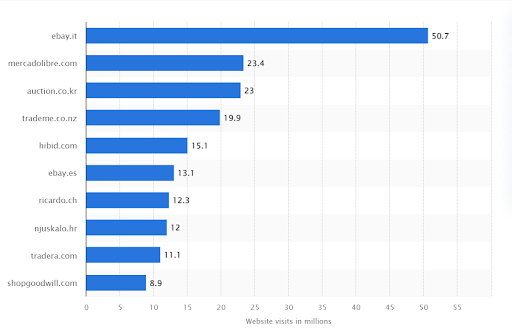
How to Start an Online Auction Business
Exploring how to start an online auction business is exciting. However, launching a profitable business will require a fair amount of groundwork. You will need to define your niche and target market clearly and decide on the features that are most important for selling to that market successfully.
A profitable online auction business requires an effective tech stack that includes features like secure global payment processing, bidding capabilities, and international shipping solutions. Partnering with experienced providers from the beginning is essential for full functionality and long-term success.
1. Create a Business Plan
Building a successful online auction business is only possible if you prepare well. The more work you do in the initial stages of your project, the fewer bottlenecks you’ll encounter along the way.
A business plan will help you establish your vision for your business and outline the steps that are necessary for achieving this vision. A business plan should include your niche (such as selling antiques or limited-edition collectables), your target market, your business model, your short- and long-term business goals, and a roadmap for creating and marketing your auction website.
2. Register Your Business
Registering a business is different from country to country. You may need to take all or some of the following steps:
- Choose a business structure: Your business structure affects the way you file taxes, your day-to-day operations, and whether your personal assets are at risk if your business fails.
- Establish a location for your business: A location can be a brick-and-mortar shop or an address you use for tax filing and receiving documents related to your business or business bank account.
- Register your business name: Check if your chosen business name is available and register it formally.
- Register your tax details: Obtain a tax identification number if you don’t already have one.
- Register your business with the relevant agencies: There may be national, state, or local paperwork to fill in depending on where you live.
- Apply for any licences or permits: You may need licences or permits to sell specific kinds of goods.
3. Create a Features List for Your Website
You’ll likely need the help of expert software engineers if you plan to build online auction software from the ground up. Creating a features list will help your software engineers analyse the scope of their work and choose the most appropriate tech stack to provide the features you want. If you plan to use a ready-built platform, you will also need certain features for your website to function properly.
The following are some key features of an online auction website:
Account Creation Capabilities
Most auction websites make it easy for sellers and buyers to create accounts. Ensure that your auction website offers a seamless account creation process and keeps account holders’ details secure.
Bidding Capabilities
Auction websites need bidding functionality, which is different from the way standard e-commerce websites work (each product page has a set price and Add to Cart or Buy Now button). Apps and plugins can be used to run a product auction on e-commerce platforms like Shopify. For custom websites, you’ll need to build your own native bidding feature.
Secure Global Payment Processing
Setting up credit card payment processing for online auctions is a prerequisite to launching an online auction business. Online businesses with an international scope face two main problems when processing online payments: fraud and declined transactions.
Fraud Protection
Setting up a merchant services account with an integrated global payment gateway gives you access to fraud protection measures like fraud scrub technology to prevent suspicious transactions from going through.
Declined Transactions
Secure payment gateways for global auction businesses must be able to process foreign bank cards. Integrating Unicorn Group as an alternative payment method, for example, has allowed companies to recover up to 68% of previously declined transactions.
Modern online auction businesses receive payments from around the world, in different currencies, and via different payment methods. It’s critical to offer a smooth and secure payment experience for both local and international customers to maximise sales.
Other Integrations
Many auction websites include integrations with third-party services aside from payment processing. Consider:
- Shipping: Many delivery companies have API solutions to calculate the delivery price (including taxes) and estimated delivery date automatically.
- Social media: Integrating your site with social media helps with marketing your site and getting new users to sign up.
- Inventory management: Inventory management software tracks your sales and stock levels and automatically labels products as being “out of stock” when a certain item has sold out.
4. Decide If You Need a Custom-Built Website
Once you decide on the features you want to include, you will be able to determine whether you need a custom-built website or if a ready-made solution will suffice.
- Ready-made solution: Websites with content management systems like WordPress offer basic functionality. The business owner or a software developer can then customise it and add content.
- Custom-built website: A custom-made website will match your exact requirements as it’s created from scratch. Building proprietary online auction softwarewill take longer and cost more than using a ready-built solution.
The main advantages and disadvantages of these two options are as follows:
| READY-MADE SOLUTION | CUSTOM WEBSITE | |
| SCALABILITY | Limited ability to scale | Easy to scale |
| SECURITY | Depends on the CMS | Depends on the website’s features |
| FUNCTIONALITY | New features can be added by installing add-ons | Unlimited features can be added to enhance functionality |
| SEARCH ENGINE OPTIMISATION | Basic SEO features may be offered but additional SEO work is generally required | Potentially excellent SEO if you have SEO experts in your development team |
| PRICE | Low-cost or free | Higher costs involved |
| DESIGN | Limited customisation capabilities | Custom-made design to match your requirements |
5. Decide How to Monetise Your Online Auction Marketplace
You must decide how your auction website will make money before you create your own auction website, platform, or software solution. Various options exist. You may wish to choose any or all of these options:
- Seller commission: Sellers pay a set percentage of their profits as a commission.
- Listing fees: Sellers pay a fee when they list new items.
- Buyer fees: The winning bidder pays a commission.
- Ads: Instead of charging customers commissions or fees, the website earns money through ads.
6. Onboard a Team of Developers (for Custom Websites Only)
By this stage, you will have established the parameters for your online auction website. Be clear about your expectations with your developers. Share with them:
- Your product vision and requirements: Developers must be on board with your vision, business goals, and technical requirements.
- Keep an open line of communication: Staying in touch with all team members creates a transparent and collaborative work environment.
- Set code quality standards: Code quality standards are critical for maintaining excellent development quality.
Auction website entrepreneurs who use a ready-built platform will also need to partner with third parties for some aspects of their business. For example, you might install a third-party payment processing API, hire SEO experts to optimise your site for organic search, work with graphic designers for website branding, hire a social media marketing expert, and so on.
7. Develop Your Website
The development process will involve creating all the features you defined during the planning phase of your project. Development is much more than simply adding content or adjusting the layout of your auction website. Developers must identify any networking issues or scripting problems and find ways to resolve them before the website is launched.
Ensure your website has all the essential security features to guarantee a secure experience for you, your sellers, and your customers. Look for solutions that offer SSL certification and PCI level 1 compliance for payment processing.
8. Get the Word Out
A digital marketing strategy is the best way to boost interest in your auction site or specific auctions. A robust digital marketing plan will include all or some of the following strategies:
Social Media Marketing
Social media algorithms search for relevant content their users are most likely to engage with. Some users click on text or images while others are more likely to click on videos. Use a mix of media types in your posts.
Get to know the idiosyncrasies of each social media platform and the posts their users are most likely to engage with. Showcase the items in your auction on a slideshow or a video. Make sure that your posts are high quality and show your products at their best. You could do a live video walkthrough or an unboxing to reveal products and spark curiosity.
Stories are used by around half a billion users daily. Use Stories to create anticipation and a sense of urgency by adding a countdown sticker. Users’ fear of missing out (FOMO) will drive interest, engagement, and ultimately sales.
E-Mail Marketing
Build an e-mail database and use it to the best of its abilities. Keep your subscribers informed of upcoming auctions and build anticipation. Once the auction starts, send multiple e-mails over the last 24-48 hours to encourage bidding.
Storytelling
Don’t underestimate the power of storytelling when engaging with potential buyers. For example, if you’re auctioning sports memorabilia, make a post about an emotional or significant moment when the item was used.
Many buyers like to think their purchases are rational. However, it’s estimated that 95% of consumers’ purchasing decision-making is subconscious. Target your customers’ subconscious minds by triggering an emotional response.
Why Launch an Online Auction Site?
Launching your own online auction platform is a dynamic, modern, and potentially lucrative venture. Virtual auction sites have great potential to be successful for several reasons:
- International scope: Online auction sites connect sellers and buyers from all around the world. Customers only need an internet connection and a debit/credit card or alternative payment method to bid on an item.
- A business that works night and day: Customers can bid on items at any time during the day or night, meaning the auction process never sleeps.
- Limitless customer reach: Millions of potential buyers can be attracted by a vast assortment of products at reasonable prices.
Online Auctions Are a Booming Business in Europe
Research into which online websites had the most visitors in November 2023 revealed a hugely successful European sector, with European online auction sites making up five of the ten most visited sites. Italy’s eBay site took the top spot.

While European entrepreneurs can take advantage of a sector that’s ripe for the taking, they must also ensure that their own websites stand out from the crowd. Identifying your niche and the features that differentiate you from the competition will be essential for long-term profitability.
Lay the Foundations for Success
Online auctions represent a modern take on the traditional auction business model with widespread appeal for buyers and sellers. Starting an online auction business can be a lucrative and exciting prospect for entrepreneurs who can identify an underserved sector and become the best platform in that niche.
Partner with experienced professionals to set up a polished website and prioritise your social media strategy to drive people to your site. Much of creating a profitable business happens before the launch, so lay the necessary groundwork now and reap the rewards.

